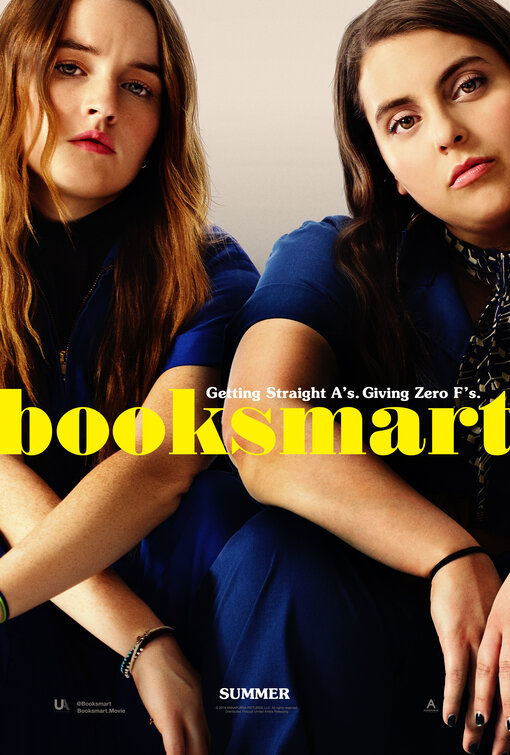Getting Straight A’s. Giving Zero F’s.
Director
Olivia Wilde
Starring
Kaitlyn Dever
Beanie Feldstein
The day before their high school graduation, Amy [Dever] and Molly [Feldstein] learn that all their dedication and hard work, which has given them reputations as pretentious and aloof, has been in vain as their fellow students have also gotten into ivy league universities despite outwardly partying, slacking off in class and showing little interest in further education. This sparks a crisis for Molly who feels they have wasted their time and abandons their pre-determined evening celebrations to attend a popular jock’s house party and live as stereotypical teenagers.
When it comes to analysing comedies, the writing and performances are (understandably) at the forefront of reviews and opinions. One thing that is often overlooked is the technical acumen on display and Booksmart is a prime example because while it merits a significant amount of praise for its creative elements, the sound design, camera work, editing and direction are all magnificently vibrant, energetic and captivating. More than that, Wilde has managed to create a time capsule release, akin to the works of John Hughes, steeped in the politics and social landscapes/pressures facing the youth of 2019 while retaining a timeless relatability for older audience members.
Over the last decade, many films have tried to imitate the energy and zeal of Superbad, setting two high school best friends on a final hurrah odyssey that tests their relationship but ultimately strengthens it with the assurance that even though they may change, these moments will be with them forever. Almost all of these imitators have fallen flat, conveying little more than the shock factor without any actual impactful or lasting weight. Present in this feature is the perfect combination of outrageous teenage comedic antics and a rather mature emotional core that resonates throughout. At the same time, Booksmart also subtly subverts several genre expectations and feels fresh due to the perspective shift. In truth, society, reflected through cinema, has always given young males a free pass; the content of Stand By Me would be difficult to imagine with an all-female cast solely due to the difference in coming-of-age experiences between genders – or so we would be lead to believe. Of course a film like Stand By Me could be written with an all-female cast, the only difference would be a wealth of additions that would need to be included to illustrate the increased pressure that young women face. A simple example of this is when Amy and Molly are trying to ascertain the location of Nick’s party and realise that a local pizza parlour has completed a large delivery and would likely know the whereabouts. Fashioning their hair into makeshift masks, they break into the back of the pizza delivery man’s car and make their demands. Immediately, he gives a wake-up call by explaining that they have willingly entered a stranger’s car, unarmed (while he has a gun), and he could easily drive them onto the interstate and abduct them with little resistance. As they get the information and depart the car, he calls over his shoulder “Don’t trust people! Oh my god!” It’s such a simple interaction but one that highlights things would almost never be considered in a male-led feature. If we take Superbad, for example, Seth and Evan’s lives are in jeopardy so frequently but we rarely worry about it because they’re male and we assume nothing too awful will happen, whereas the reality for young women is different – as obvious as that may sound.
At the centre of this movie is the duo of Dever and Feldstein that are a magnificent find; the timing and chemistry are genuinely astounding, feeling both sincere and free from superficiality. On top of the whip-smart dialogue present in the script, the delivery and physical comedy display a confidence and capability which shows promise that these actors will go on to have very successful careers. I would also add that so many of the characters and situations are extraordinarily relatable on so many levels. From the students who have worked hard only to discover that others appear to be coasting by, the further revelation that everyone is dealing with their own insecurities and issues and that the adults barely have their own lives figured out. The principal moonlighting as a Lyft driver is a standard commentary on underpaid teaching positions but Amy and Molly’s favourite teacher stating that she felt she didn’t experience enough radical, life-changing things as a teenager so went off-the-rails by over-compensating in her 20s and regretted so much of it, cut wonderfully deep for me. Another stellar move is taking the key lesson from the conclusion of Mean Girls, illustrating these kids not necessarily turning on one another but generating unusual alliances due to the common ground of adolescent tribulations. More so than that, this film manages to recreate the warzone of high school without including intentionally malicious individuals; the worst we get is highly opinionated, self-absorbed kids who are trying to figure out who they are – which is one of the most accurate representations of teenage life. The film is not without antagonistic individuals but this villainless high school film is an art-form and a welcome treat.
In spite of all the above gushing, the film isn’t perfect. The events depicted provoke little fallout and follows the same path as most teen comedies, even a character getting arrested is given a rather fantastical resolution, enforcing the movie’s overall consequence-free, feel good tone. What’s more, aside from the female and LGBT perspective, the actual plot doesn’t really offer anything new. The standard archetypal characters are present, the only difference is that the bully/villain angle is played down or explained. But if I’m honest, this could be said of most genre pieces; you don’t need to reinvent pasta for a good pasta dish, you just need the right accoutrements.
Release Date:
24th May 2019
The Scene To Look Out For:
There are plenty of fantastic scenes to highlight but the opening five minutes are spectacular. Molly sits cross-legged on her bedroom floor, listening to a motivational tape, reinforcing the notion that she is truly better than others because she is giving 110%. Amy then picks her up and they spend an excessive amount of time dancing outside Molly’s house. It’s honestly fantastic and indicated to me, so very early on, that this film was going to be noteworthy.
Notable Characters:
Gigi (played by Billie Lourd) is a strange medley. On the one hand, she represents the classic stoner character who seemingly appears wherever the plot requires her, connected to everyone and blessed with insight; essentially an otherworldly spirit guide. On the other hand, she’s also a spoilt rich girl in desperate need for validation and attention. Again, two archetypes that don’t often gel but Lourd brings this wealthy insecure oddball to life superbly.
Highlighted Quote:
“Excuse me madam, are you judging people’s sexual preferences? Because you fuck a panda every night”
In A Few Words:
“Sharp, witty and endearing, Booksmart deserves to become a classic”
Total Score: 4/5
![The Red Right Hand Movie Reviews [Matthew Stogdon]](https://reviews.theredrighthand.co.uk/wp-content/uploads/2021/12/cropped-header1.png)




